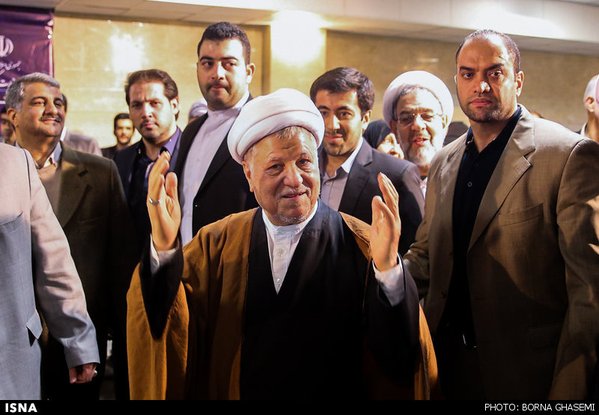PHOTO: Hashemi Rafsanjani registers on Monday for Assembly of Experts elections
LATEST
Amid Iran’s in-fighting before February’s Parliamentary elections, critics have moved closer to accusing former President Hashemi Rafsanjani of sedition.
Brigadier General Ali Fazli, the deputy commander of the paramilitary Basij, led the latest round of attacks. At a ceremony in western Iran, he addressed Rafsanjani’s proposals for greater supervison of the Supreme Leader and the creation of a ruling council after the death of the current leader, Ayatollah Khamenei: “Those who failed in the sedition are seeking to introduce the idea of making the supreme leadership into a council.”
Fazli tied his allegation to the mass protests after the disputed 2009 Presidential election, saying “the 8-month sedition took as much energy” as the Iran-Iraq War from 1980 to 1988.
Rafsanjani provoked the anger of hardliners in that crisis with his defense of the right to protest. The former President was stripped of his role as Tehran Friday Prayer Leader and eventually lost his leadership of the Assembly of Experts, the body which chooses the Supreme Leader. His family was put under pressure, with two of his children imprisoned. In 2013, he was barred by the Guardian Council from standing in the Presidential election.
However, Rafsanjani has had a revival after the surprise victory of his protégé Hassan Rouhani in that election. He is trying to regain the Assembly chair in February’s vote, and hardliners fear the success of a Parliamentary bloc supported by Rafsanjani and Rouhani.
The head of judiciary, Sadegh Larijani, and commander of Iran’s armed forces, General Hassan Firouzabadi, have both criticized Rafsanjani’s “baseless claims” in the last week. On Tuesday, Larijani came close to the sedition allegation, implicitly accusing Rafsanjani of leading a “secretive movement”.
The spokesman of Parliament’s National Security Commission warned on Wednesday, “The principle of the velayat-e faqih [the guardianship of the Supreme Leader] is the system’s red line,” while the editor of the hardline Kayhan pursued the sedition theme at a Basij conference, saying the 2009 post-election protests “were directed” by the “America, England, and Zionist regime triangle”.
Hossein Shariatmadari declared, “If the [2009] sedition was successful, America would have no need for Daesh [the Islamic State].”
Rafsanjani refused to back down on Wednesday. He said at a meeting with MPs,
Unfortunately some people – whether knowingly or unknowingly – are weakening the popular base of Iran’s political system with strange, irrational, and reckless language and behavior….
Some people are attributing their own remarks to the Supreme leader….Considering their illogical and irrational positions [on certain topics], this damages the lofty position of the Supreme Leader and the velayet-e faqih.
(Hat tip to Iran Press Review for translations)
Rouhani Defies Projections, Says Economic Growth Will Be 5%
Defying recent projections of Iran’s stagnation, President Rouhani declared on Wednesday, “Next year we will reach 5 percent economic growth.”
The International Monetary Fund said earlier this week that, with US and European sanctions still to be removed, Iran’s economy will slow to about zero growth in 2015/16. However, the IMF foresaw an expansion of between 4 and 5.5% in 2016/17 when sanctions are fully removed and Iran increases oil production and exports.
Rouhani also tried to push away questions about a large Government budget deficit next year as revenues are depressed by the sharp fall in global oil prices. He maintained that only 25% of the budget, which has still to be presented to Parliament, will be reliant on oil income, and he declared an increase of 90% in funds for construction to complete unfinished projects.
The President also proclaimed that inflation, which was 45% when he took office in 2013, has fallen to 9.9%. The IMF said in its report that the annual rate is still 14%.

